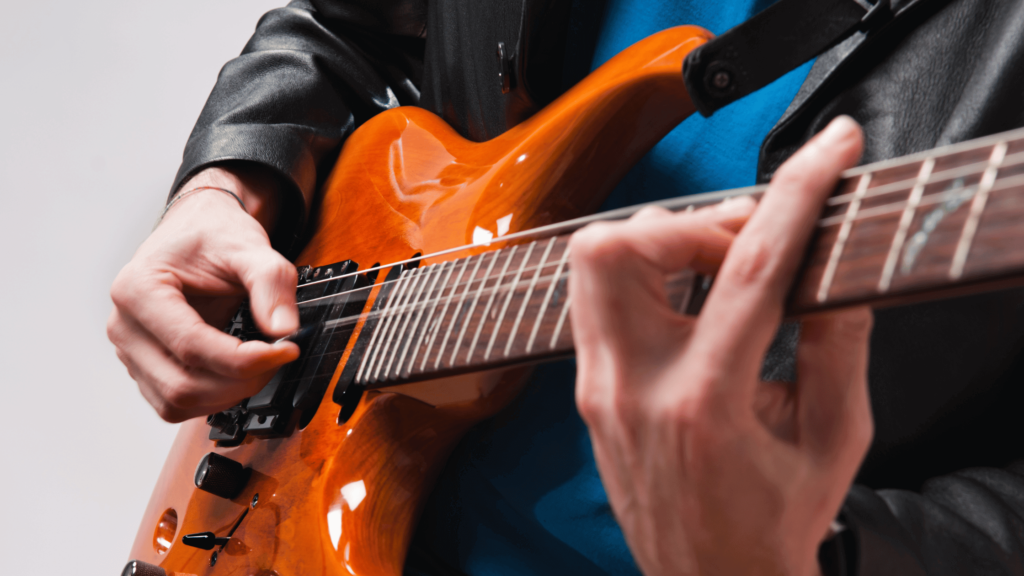How you view yourself plays a powerful role in shaping your habits and approach to practice. When you identify as a guitarist or musician—rather than someone who just occasionally picks up a guitar—your mindset shifts, and the discipline to practice becomes almost effortless. Let’s explore why seeing yourself as a musician can transform your practice routine and lead to long-term success.

Identity Shapes Behavior
To illustrate this idea, let’s consider the story of Philippe Petit, the French high-wire artist famous for walking between the Twin Towers. When asked why he risked his life to perform such a daring feat, Petit simply said, “I see two towers, and I walk.” For him, walking a high wire wasn’t an act of discipline; it was a natural extension of who he was.
The same principle applies to practicing guitar. If you see yourself as a guitarist, practicing becomes less about discipline and more about fulfilling your identity. It’s simply something you do because that’s who you are. This shift in perspective eliminates much of the resistance that comes with starting and maintaining a practice routine.
From Ownership to Identity
There’s a progression in how people relate to their guitars. At the lowest level, someone might say, “I own a guitar.” The instrument might sit under their bed, untouched for weeks or months. A step above that is, “I play guitar,” where the individual occasionally picks up the instrument to strum a few chords. Then there’s, “I’m a guitar player,” indicating regular engagement and perhaps a commitment to improving. At the highest level is, “I’m a musician,” where playing and practicing are integral parts of one’s life and identity.
Each of these levels reflects a deeper involvement with the guitar. The higher the level, the less external motivation is needed to practice. When you identify as a musician, practicing isn’t something you have to make yourself do; it’s something you’re drawn to naturally.
Discipline vs. Enjoyment
People often mistake consistent practice for discipline, assuming that those who practice regularly are forcing themselves to do something unpleasant. In reality, most dedicated musicians enjoy the process of practicing. They may not love every moment of it, but they find satisfaction in the journey of improvement and creativity.
Think of it like going to the gym. Regular gym-goers don’t hit a personal record every session, but they enjoy the process of working out because it aligns with their identity as someone who values fitness. Similarly, when you see yourself as a musician, practicing guitar becomes enjoyable, even if progress is slow or incremental.
Making Practice Non-Negotiable
We all have non-negotiable activities in our lives. No matter how busy you are, you find time to shower, eat, or walk your dog because those activities are essential to your identity or responsibilities. Practicing guitar can become one of these non-negotiable habits.
To make this shift, start small. Commit to practicing for 15-30 minutes a day, no matter what. Over time, this routine will solidify, and practicing will feel as natural as brushing your teeth. As you build this habit, your identity as a guitarist will strengthen, further reinforcing the behavior.
Overcoming Initial Resistance
If practicing guitar currently feels like a chore, it’s important to focus on building momentum. Start by setting achievable goals and celebrating small wins. For example, learn a simple riff or chord progression that you’ve always wanted to play. These early successes will boost your confidence and help you enjoy the process.
At the same time, remind yourself that your identity as a musician isn’t tied to perfection. You don’t need to master every piece you play immediately. What matters is showing up consistently and embracing the journey.
The Ripple Effect of Identity
When you see yourself as a musician, the benefits extend beyond your practice routine. You’ll likely find yourself listening to music more deeply, seeking out new challenges, and connecting with other musicians. This identity can also enhance other areas of your life, teaching you discipline, patience, and a growth mindset.
Moreover, identifying as a musician helps you stay committed during challenging times. Life is full of competing priorities, but when being a guitarist is part of who you are, you’ll find ways to keep practicing—even if it’s just a few minutes a day. This resilience will ensure that you continue to grow, no matter what obstacles come your way.
A Mindset Shift with Lifelong Benefits
Ultimately, how you see yourself shapes the actions you take. If you identify as someone who “owns a guitar” or “plays occasionally,” practicing will always feel like an optional activity. But when you embrace the mindset of “I am a musician,” practicing becomes a natural and enjoyable part of your life.
This shift in perspective doesn’t happen overnight, but it’s worth pursuing. As you develop this mindset, you’ll not only improve your guitar skills but also experience the deeper joys of creativity and self-expression. Remember: You’re not just playing an instrument; you’re shaping the person you want to be.
About The Author
Brian Fish is a professional guitarist who has been dedicated to helping other guitar players in Northeast Ohio pursue their musical dreams since 1994. He’s passionate about guiding others on their musical journey! He is the Guitar Playing Transformation Specialist, instructor, mentor, trainer, and coach at Guitar Lessons Geauga.
Brian has also created the fantastic rhythm course, “Ultimate Rhythm Mastery,” which is available at MusicTheoryForGuitar.com.
If you live in Geauga County / Northeast Ohio, Guitar Lessons Geauga can help you become the player you’ve always wanted to be. Click the button below to request your FREE no-obligation trial lesson

